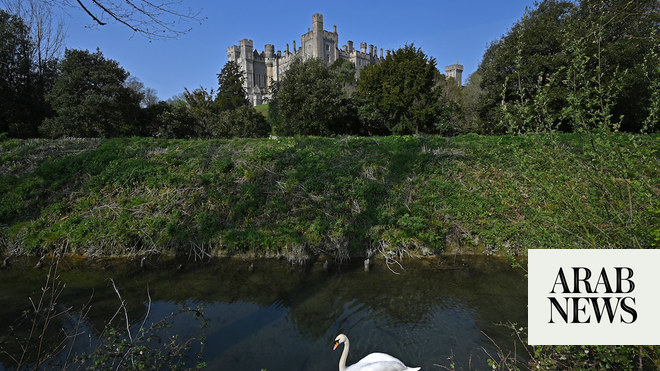
Last week, I watched a match at Arundel Castle’s cricket ground in West Sussex, England. The castle was founded in 1067 and a park was formed around it in the early 19th century. In 1897, the first recorded match took place on a newly completed cricket ground. This was instigated by the 15th duke of Norfolk, whose family seat is Arundel Castle.
His son, Bernard Fitzalan-Howard, 16th duke of Norfolk (1917-1985), much enhanced the development of cricket at the castle. Most notably, he made the venue famous by establishing a tradition of touring sides playing one of their early matches there, often the opening one.
Records suggest that the first one was against the Australian touring side in 1956. Little did the 1956 tourists know that, later in their tour, they would be subject to one of most extraordinary feats of bowling in Test match history. In the fourth Test at Manchester, England bowler Jim Laker claimed 19 of the 20 Australian wickets to win the match.
As I observed the match at Arundel Castle, the contrast between what I was watching in that setting and others in which contemporary cricket is being played was stark. The ground has been described by spectators, visitors and players alike, as quintessentially English. It is a 3.5-acre amphitheater, surrounded by trees, with views over the River Arun valley and, through a purposely designed gap, stunning views of rolling hills. It has accommodated upwards of 9,000 spectators, all situated on either grassy banks or on flat ground around the boundary.
This year, 36 matches and events are listed on the fixture card of the Arundel Castle Cricket Club. These embrace cricket at different levels and across a range of abilities. The visiting Australian team will not play there. Indeed, the forthcoming Ashes tour will be the first time in history that an Australian team’s itinerary consists only of Tests. As befits ACCC’s links with Australia, other Australian teams will do so, including the Melbourne Cricket Club and Sydney Cricket Ground X1. Six matches will be played by the Duke of Norfolk’s X1, while two 50-over women’s domestic matches are scheduled. At the other end of the scale, the Arundel Castle Cricket Foundation has introduced programs aimed specifically at youngsters with disabilities and special needs, particularly from inner-city backgrounds.
The financing of cricket at Arundel Castle was heavily dependent upon the duke’s patronage and on income from the annual visit of the touring team. After the duke’s death, his wife Lavinia, aided by people influential in both English and international cricket, was determined to carry on the tradition. Money was raised to form the Friends of ACCC, which would support the duchess’ initiative and continue to do so after her death in 1995. However, these endeavors received a body blow when the England and Wales Cricket Board informed ACCC that it would no longer be able to host matches against touring Test teams.
Times were changing. International calendars were becoming more crowded and commercial pressures more telling. Matches against touring teams, other than internationals, would be played against counties, which needed the income. So, too, did ACCC.
A series of significant donations from supporters and a beneficial agreement with ECB for ACCC to host a number of non-first-class matches helped to sustain the club during the years after the income stream from tourist matches ended. Further pressure on finances was caused by the pandemic, but once first-class cricket became possible in the late summer of 2020, the ACCC was asked to host two county matches. Although no spectator income was available, support for facilities hire was provided, which improved the financial situation.
Some readers may find it strange that a cricket club with direct links to one of Britain’s most influential families, playing on a historic and famous ground, should experience a fragile financial existence. In addition to his title, the duke of Norfolk also holds the hereditary position of earl marshal. This carries the duty of organizing state occasions, including the opening of parliament and the coronation of the monarch, a task which fell recently to the current duke.
None of this can halt the winds of change currently blowing through cricket that are negatively affecting the grassroots in a country that used to govern the game. Power and influence in cricket have ebbed away from Britain, specifically away from the Marylebone Cricket Club at Lords and those who ran the game from there as upholders of an imperial past, when cricket was introduced to colonies. Some of those countries have welcomed this loss of power and influence, which found a catalyst for acceleration in the India Premier League. This is where now money and influence lie, which has begat copycat tournaments, dominated by Indian-owned franchises.
Growth has occurred in women’s cricket in countries where it used to be a minor sport and in countries where it barely existed. More than one of those countries has the funds to invest in cricket if they so choose. This threat to the old, disappearing order in Britain has caused much hand-wringing among those of that order. It is, however, too late.
Country house cricket of the type witnessed at Arundel will soldier on, no doubt, but T20 cricket, especially in the shape of franchise tournaments, is the new face of the game. Its funding comes not from gate income or national cricket boards but from rich corporates and individuals located far away from Lords. There has been loose talk in sections of the British press of such funding finding its way into the English game.
A more possible scenario is a change in the way certain players are contracted. Currently, they are contracted to national or regional boards. Instead, they may be offered the option of being contracted to franchises. This is a far cry from the days when a lord or lady of the realm invited teams and players to perform at his or her country house. In the new scenario, players have financial rewards rather than prestige through association.










